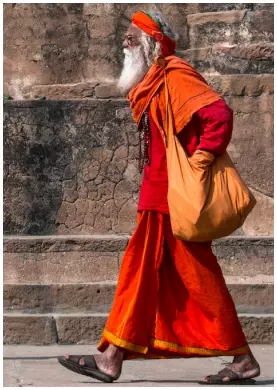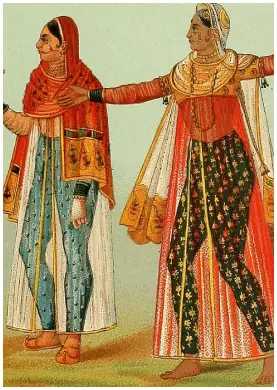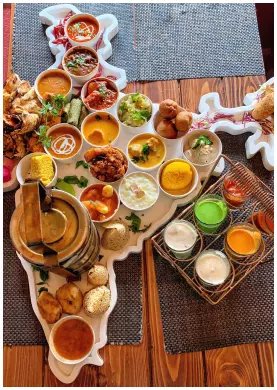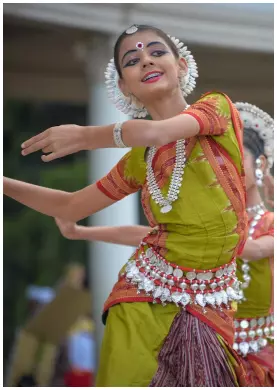
customs
and beliefs

family
values

clothing
types

indian
cuisine

art
and craft

One of the oldest civilizations in the world with a kaleidoscope of rich culture and heritage, India is a fascinating mixed bag of history, spirituality, adventures, cuisines, nature, chaos, and peace at the same time.

Shiva Linga at Amarnath
It is a renowned and sacred stalagmite of ice which is created by dropping water through the mountain hole and grows up vertically to form that Linga. It is believed that on the Shravan day – Lord Shiva described Amar Katha – the mysteries of universe- to Goddess Parvati.

Rock Carved Kailash Temple
A world heritage site, the entire temple is carved out of a huge mountain, a technique unique and quite hard to accept from that period. It remains one of a kind in the entire world and is result of a very advanced civilization and artisans.

Existence of Adam’s Bridge
The bridge is 30km long and differentiates the Gulf of Mannar from the Palk Strait. The bridge has been mentioned in the Hindu epic Ramayana which Lord Ram created with the help of his monkey and gorilla force to get Goddess Sita back from Sri Lanka.

Son Bhandar Caves of
Bihar
Translating to ‘store of gold’, the cave is hollowed out from a single giant rock and is believed to be the doorway to the treasures of Bimbisara, a Magadhan king. When he was imprisoned by his son, his wife kept all the treasure here. There are undeciphered inscriptions on the walls which are supposed to be the clues to open the doorway. The British once tried to cannonball their way out but with no success.

The Nine Unknown Men
India’s version of Illuminati, the mysterious ‘9 Unknown Men’ is a secret society believed to be founded by Emperor Ashoka after the Kalinga battle, where 100,000 people were killed. Each of the men had been assigned with a book of knowledge on subjects ranging from time travel and propaganda to microbiology and psychological warfare. The actual identities of these men were never known, but it is believed that the secret society is protected over generations and still exists.

The Ghost Village of
Kuldhara
Located near Jaisalmer, the village was once a prosperous area a few hundred years ago, until one night, all its 1500 villagers left the village without a trace. Legend has it, that they left to escape the unjust rule and taxes of ruler Salim Singh while leaving a curse on the area. Till this day, the area is uninhabited and if anyone tries to stay, dies a brutal death.

The Secret Chamber of
Padmanabhaswamy Temple

The Ghost Village of
Kuldhara
Located near Jaisalmer, the village was once a prosperous area a few hundred years ago, until one night, all its 1500 villagers left the village without a trace. Legend has it, that they left to escape the unjust rule and taxes of ruler Salim Singh while leaving a curse on the area. Till this day, the area is uninhabited and if anyone tries to stay, dies a brutal death.

The Secret Chamber of
Padmanabhaswamy Temple

The Secret Chamber of
Padmanabhaswamy Temple

Trekking in the Valleys and
Snow-Clad Hills

Get Royal Treatment in Glamping
Glamping means glamorous camping. What happens is, your dream travel experience gets a touch of luxury and lavishness which makes the experience even more memorable. From royal treatment in the luxury tents to staying on a tree house, the camps are well furnished and offer dining, recreational, and lounging option which is nothing less then staying at a premium hotel. Best places to go for glamping are Jaisalmer, Ladakh, Wayanad, Rishikesh, Ranthambore, etc.

Relish a Hearty Meal at the
World’s Largest Kitchen
The holy Golden Temple in Amritsar runs the largest kitchen I the world which feeds about 1 lakh people a day for free. The tradition was started by Guru Nanak, founder of Sikhism, and it feeds pure vegetarian food to all people regardless of caste, religion, or status in the same way. The langar can accommodate 5000 people at once and you can also participate in volunteering activities like serving food, preparing vegetables, washing dishes, making chapati, etc.

Have Fun Enjoying the
Nightlife
Nightlife in India can be enjoyed in different ways and caters to all kinds of visitors. whether you are a party popper, a foodie, a dancing diva, or even a shopaholic, there is something for every kind of desire. Eat paratha at late night near India Gate in Delhi, do pottery shopping at Matka Market in Delhi, enjoy dancing and eating at the several pubs and lounges across the country, watch night light and sound shows at forts and temples, and whatnot, India is a gem of surprises and excitement combined.

Delight in the Houseboat Cruising
at Kerala Backwaters

Delight in the Houseboat Cruising
at Kerala Backwaters
India is a fascinating place to visit, and it has many of great tourist attractions that may make your travels more enjoyable. Some of the remarkable features of this nation that fall under the category of natural marvels are magnetic hill, floating island, disappearing beach, and more.


Kutch's Shining Salt Deserts in
Gujarat

The Living Root Bridges of
Meghalaya

Floating Island in Loktak Lake
Manipur

Dussehra
Another Hindu festival also known as Vijayadashami, Dussehra is celebrated by enactment of scenes from Ramayana and is finished with Ravan Dahan – the burning of a huge effigies of Ravana, Meghnath, and Kumbhkaran. Fairs are also organized with amusement rides in different cities.

Gurupurab
Festival of the Sikhs, is it celebrated as the anniversary of ten Sikh gurus and special assemblies on the lives of gurus and langars are organized in gurudwaras. Karah prasad is distributed among devotees and hymns are chanted throughout the city.

Rakshabandhan
Rakhi festival is celebrated among Hindus and mainly in the north and central India. The festival signifies the bond between brother and sister where the sister ties the thread called rakhi to the brother and applied tilak on the forehead and the brother in return, vows to protect the sister.

Eid-Ul-Fitr
It is a major festival of the Muslim community. People wear new clothes and attend a special community prayer in the morning in Masjid, visit friends and relatives and exchange sweets. It is the conclusion day of the month of Ramadan where Muslims keep fast for a month.

Mahavir Jayanti
It is the festival of the Jains which marks the birth of Lord Mahavir. The statue of Lord Mahavir is bathed with milk and flowers and even a grand parade of Lord Mahavir’s idol is carried out in streets.

Christmas
A festival of the Christian community of India, it represents the birth of Jesus Christ and is celebrated on the 25th of December. All the churches are lit up and decorated to celebrate the birth of lord and people at home prepare traditional cakes and decorate the Christmas tree.

Buddha Jayanti
Also known by the name Buddha Purnima, the festival is celebrated as the birth of Gautam Buddha who introduced the philosophy of Buddhism to the world. The followers attend Buddhist teaching and wear white to follow the tradition.

Gurupurab
Festival of the Sikhs, is it celebrated as the anniversary of ten Sikh gurus and special assemblies on the lives of gurus and langars are organized in gurudwaras. Karah prasad is distributed among devotees and hymns are chanted throughout the city.

Rakshabandhan
Rakhi festival is celebrated among Hindus and mainly in the north and central India. The festival signifies the bond between brother and sister where the sister ties the thread called rakhi to the brother and applied tilak on the forehead and the brother in return, vows to protect the sister.

Eid-Ul-Fitr
It is a major festival of the Muslim community. People wear new clothes and attend a special community prayer in the morning in Masjid, visit friends and relatives and exchange sweets. It is the conclusion day of the month of Ramadan where Muslims keep fast for a month.

Mahavir Jayanti
It is the festival of the Jains which marks the birth of Lord Mahavir. The statue of Lord Mahavir is bathed with milk and flowers and even a grand parade of Lord Mahavir’s idol is carried out in streets.

Christmas
A festival of the Christian community of India, it represents the birth of Jesus Christ and is celebrated on the 25th of December. All the churches are lit up and decorated to celebrate the birth of lord and people at home prepare traditional cakes and decorate the Christmas tree.

Buddha Jayanti
Also known by the name Buddha Purnima, the festival is celebrated as the birth of Gautam Buddha who introduced the philosophy of Buddhism to the world. The followers attend Buddhist teaching and wear white to follow the tradition.
If you are looking for a new and unique way of lifestyle, India is the place to be. The country offers its visitors an invaluable experience with its culture and historical heritage and the friendly people who treat guests like God. The multi-ethnic populous nation adds a unique and vibrant quotient to this land which is what India is about.

customs
and beliefs

family
values

clothing
types

indian
cuisine

art
and craft
Based on the phases of evolution of the country and its people, the history of India can be categorized as Ancient history, Medieval history, and the Freedom struggle.




Zero and the Number System
The concept of zero first appeared in India during 458 AD, when the Indian mathematician Aryabhata created a symbol for zero. The mathematical operations like additions and subtraction then started using zero. Also, the number system which uses decimal place-value and zero was invented in India between 1st and 6th centuries.

Buttons
Buttons were used as ornaments during the Indus Valley Civilization which was revealed after the excavation of the MohenjoDaro site. these buttons were made of shells with two holes at the center.

Natural Fibres
During the 5th-4th millennium BCE in the Indus Valley Civilization, people started cultivating cotton and jute and thus natural fibres originated in India. Prior to this, Greeks used to wear animal skin. The art of cotton spinning and converting it to fabric was later invented in India as well.

Cataract Surgery
The Father or Surgery, Sushruta was an ancient Indian physician who performed the first cataract surgery in the 6th century BCE. He removed the lens through a curved needle and kept it in warm butter for a few days till the cataract was healed. His work was later translated into Arabic language and got transported to European countries.

Diamonds
Diamonds were discovered in India. Huge deposits of diamonds were found in central India along the Krishna and Godavari rivers which were mined almost 5000 years ago. Till the 18th century, India was the only country to have diamond deposits when these sparkling stones were found in the mines of Brazil.

Systematic Organized Education System
Residential schooling which was known as ‘gurukul’ in ancient India has been in practice as long as the existence of the Indian civilization where one teacher taught several students. Universities such as Nalanda, Taxila, and others were some of the first and global universities in the world where students from other countries also came to study.

Ayurveda
Ayurveda is the first school of medicine known to humans which was created by Charak, the father of medicine, 2500 years ago. Today, ayurveda is practiced worldwide and is fast regaining its significance in the world.

Wireless Radio Communication
Sir Jagdish Chandra Bose made the first pubic demonstration pf radio communication waves in 1895, two years before Marconi’s demonstration in England. More than a century later, Sir Jagdish Bose has now been credited for his achievement.

Chess
Chess, earlier known as Shataranj, was invented in India during 280C-550 CE in the Gupta empire. Its early form in the 6th century was known as chaturanga.


National Animal
A striped animal is the magnificent tiger, Pantheratigris. Its fur is thick and golden with stripes. Because to its outstanding combination of grace, strength, agility, and incredible power, the tiger is delighted to be the national animal of India.

National Flower
The national flower of India is the lotus, NelumboNuciferaGaertn.. It is a sacred flower that is revered in both ancient Indian art and folklore. It has represented Indian culture as a fortunate sign since the beginning of time.

National bird
Pavocristatus, India's national bird, is a colourful bird with a long, narrow neck, a white patch behind its eye, and a fan-shaped crest of feathers. It is swan-sized in size. The male of the species has 200 long, extended feathers on each breast and a magnificent bronze-green tail, making him more colourful than the female.

National anthem
The National Anthem of India The Bengali original of Jana-gana-mana by Rabindranath Tagore was chosen as India's National Anthem by the Constituent Assembly on January 24, 1950. It was sung for the first time on December 27, 1911, at the Calcutta Session of the Indian National Congress.

National flag
The top, middle, and bottom of the country's tricolour flag are equally divided into white, India green, and kesaria. The flag has a width to length ratio of two to three. In the centre of the white ring is a navy-blue wheel that represents the chakra.

National song
The people were inspired to fight for their independence by BankimchandraChatterji's Sanskrit hymn VandeMataram. It is on an equal footing with Jana-gana-mana.

National anthem
The National Anthem of India The Bengali original of Jana-gana-mana by Rabindranath Tagore was chosen as India's National Anthem by the Constituent Assembly on January 24, 1950. It was sung for the first time on December 27, 1911, at the Calcutta Session of the Indian National Congress.

National flag
The top, middle, and bottom of the country's tricolour flag are equally divided into white, India green, and kesaria. The flag has a width to length ratio of two to three. In the centre of the white ring is a navy-blue wheel that represents the chakra.

National song
The people were inspired to fight for their independence by BankimchandraChatterji's Sanskrit hymn VandeMataram. It is on an equal footing with Jana-gana-mana.
Copyright 2012-2025 Indiamap Digital Private Limited. All rights reserved. Privacy Policy | Terms of Use